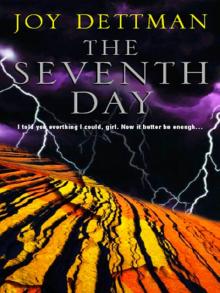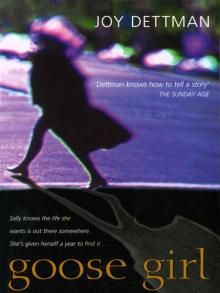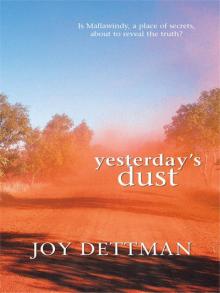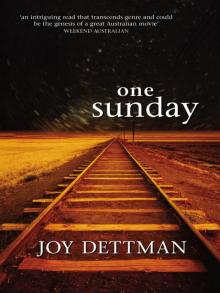- Home
- Joy Dettman
Goose Girl Page 3
Goose Girl Read online
Page 3
And Mummy had sold everything. ‘Too full of sad memories, my precious girl.’
What else was there but the memories? They carried them around like Grandma’s dining room suite and her ornaments, packing them and filling up all the empty spaces with old sad memories so there was no space for making new happy ones. Daddy and the boys had been dead for three horrible years, but for Mummy it was like they’d died yesterday.
The green paint on the trellis was nearly all gone now. Sally stood on the fence rail and reached high, picking at a flake of green still held safe between the wood where it crossed over. She picked with her fingernail until she got it. It was only a little bit, but still good and green, and she held the flake in her palm because it was precious, like a diamond, or an emerald – even more precious than that because Daddy’s hand had painted it there.
Her jeans kept slipping down; they were Raelene’s jeans and Raelene was heaps bigger than Sally. So was Carol Rigg. Everyone who was eleven was bigger than her. Everyone who was nine was bigger because they didn’t get starved half of their lives and picked on for the other half.
Squeak-squawk. Squeak-squawk.
That swing noise sounded so sad today. It made her feel so sick-sad in her heart and in her head. Carol Rigg didn’t care. She kept on swinging, doing it on purpose, just to torment, like she said Sally’s mother was in a nuthouse, just to torment.
It wasn’t a nuthouse. It was a hospital for people with nervous breakdowns.
Saturday. What a horrible, rotten day. Raelene was at a birthday party. That was half the reason why Sally was feeling sick-sad, and all curled up inside like a slater bug. If she still lived at 29 Carter Street, and if she still went to Raelene’s school, then she would have got an invitation to the party too. They’d always got invitations to the same parties when she’d lived next door. But she didn’t live next door. Rotten Carol Rigg did.
She couldn’t see over the wall of vine, so she climbed up the fence and onto the trellis. Pieces of it broke away as she placed her weight on them, but she found safe footholds and made it up to the garage roof. If Raelene’s father had been at home he would have banged on a window and roared like a bull, but he wasn’t home. He played golf on Saturdays.
She liked it up on the roof; she could see right inside the kitchen window next door, and she could see in her old bedroom window, where the Riggs had put up new curtains. They’d tossed away Sally’s pink ones with the flowers. Probably tossed them in the rubbish bin. Quickly she looked away from that window and back to the kitchen, where Carol Rigg’s mother was working at the sink, washing dishes or something.
‘I’m going to tell on you. You’re not allowed to get up there. Mr Mason said so,’ Carol Rigg said.
Sally ignored her. Carol was just pure jealous; she couldn’t have climbed on a roof even if she’d been game to try. She was as fat as a pig, and she wore dresses with frills and flowers on them. And glasses, stupid blue ones that slid down her fat nose because it wasn’t long enough and was always sweaty. Yesterday, she’d got red-faced jealous when Raelene wouldn’t go over to play, and she went inside sulking, then came out with two ice creams, and she called Raelene over to the fence and gave her one. Then she whispered something, and Sally knew she’d been whispering about Mummy and the nuthouse even if Raelene wouldn’t say so.
‘You’ll just get mad at me,’ Raelene kept saying and letting the ice cream drip. ‘I don’t like these much,’ she said – which was a lie and Sally knew it. ‘You have it, Sally.’
‘It’s probably poison.’
That’s when things started getting sad and mad and bad in her head, so she’d walked up to the shop on the corner and she’d nicked a chocolate bar. It wasn’t the first time either. She was good at nicking things.
Squeak-squawk. Squeak-squawk.
That was yesterday, and the mad and the bad had got worse in the night.
On her stomach now, stretched out flat on the roof, the roofing iron warm beneath her, she was reaching down to pick green passionfruit, which she threw at Carol Rigg. She didn’t miss either, and Carol screamed out to her mother, who screamed out at Sally, but the swing kept on squeak-squawking.
Then it came to her, a really funny idea. It was her special pretend trick to make the sad go away. She thought about stupid things that made her laugh, and after a while the game got like it was real and she laughed so hard that it killed the sad. Just like Daddy always used to say, ‘Laugh and the world laughs with you, Sall, my precious gal.’
The world was really laughing with her as she climbed down, and almost choking with giggling when she got the hose with its orange spray thing on the end. She turned the tap on full bore, but with the spray turned off, and she tied the hose around her. It wasn’t easy climbing back up, the hose trying to pull her down, but she could do anything she wanted to do, and she wanted to get the hose up on the roof. And she got it up there.
Squeak-squawk. Squeak-squawk.
Daddy used to put grease on the parts that made that noise, because that sound used to drive Mummy crazy; even way back then she was a bit crazy, and the swing had always made its squeak-squawking, right from the Christmas Day when it was put up, when she was four and Shane was three and there wasn’t any Robby or Nicky. For a long time there had only been Sally and Shane.
She shook that thought away and pointed the spray down the roof like a gun aimed at Carol’s head and she waited for her to look up. She never spoke to her. Never once. Carol Rigg was a house thief, that’s why.
Then the house thief pushed her glasses up and she lifted her head and squinted up at the garage roof, looking all bug-eyed and open-mouthed, like Oooo. That’s when Sally turned on the spray and let her have it, right up her fat nose.
Her glasses went flying and she nearly fell off the swing, then when she did get off, she fell over, and she looked like a screaming turtle on its back. Sally kept hosing her until she got up and went yelling and slipping to the back door with the water following her.
Her mother tried to come out. She was yelling like crazy too, so Sally gave her something to yell about.
Then Raelene’s mother came out with little Jamey. She was tall and fat and slow. She looked around, sort of slow, like she always had a million hours of time to do things. She looked slowly at the fence, then over the fence. For a while she didn’t know what was the matter; she couldn’t see Sally on the garage roof. She looked up at the water, sort of surprised, like she thought there was a cloudburst, but not properly burst, just sprung a leak, and it was leaking all over next door. It wasn’t until she looked up that she saw where the leak was coming from.
A lot later, around dinnertime, Carol and her mother had changed into dry frilly dresses and Mr Rigg had come home and he’d found the blue glasses, which were back on Carol’s nose. Raelene’s father was home from golf so they were all standing together at the fence. Half of the neighbours were out with their sticky noses, but Sally was a bird on her perch, watching everything, hearing everything and busting to go to the loo.
‘She’s a social welfare problem.’
‘What can you expect? The poor little kid. I mean, dragged around from pillar to post, like she’s been. She doesn’t know who she is any more.’
‘I’d call the welfare. That little terror isn’t going to come down.’
‘Come on, sweetie. You can’t sit up there all night. We’ve got crumbed sausages for dinner.’
Sally really liked Raelene’s mother, and she loved her crumbed sausages, but she didn’t get down, not even for sausages. She kept picking and throwing passionfruit at Carol Rigg’s roof and watching them roll into the guttering, hoping they were blocking it.
Mr Rigg and Raelene’s father got the ladder out; they climbed up, but Sally dodged them all over the big roof, praying for it to get dark in a hurry so she could pee into the next-door yard.
That’s what dogs did. They peed on things to mark them, like saying this is my place, stay away you other dogs. It di
dn’t matter what everybody in the whole world thought, that house still belonged to Sally.
Then the welfare people drove up with a police lady. They spoke for a while before the man climbed up the ladder at the front of the garage.
He thought that he made Sally come down, but he didn’t. It was just because of the loo. She jumped from the back of the garage to the lawn, and it was like flying, like wind in her face flying away from everyone and everything, sort of free – until she hit the lawn and all of her air was pushed out. But she got some in when the police lady ran around the back. Sally dodged her behind the peach tree until she could make a break for the house, where she locked herself in the loo.
They took the door off with a screwdriver and she had to go to some other place because Raelene’s father said he’d taken her in out of the goodness of his own heart, even if everyone knew he didn’t have one. And Raelene’s mother said, ‘We feel that sorry for the poor little kid, but as Jim says –’
Then Raelene’s father butted in. ‘That sort of behaviour can rub off on our girl.’
‘Who cares?’ Sally said. ‘I don’t care where I go.’ She walked to the big white car as if she didn’t care one little bit, then another lady drove up with a car full of kids and balloons and Raelene got out crying and she ran to the car.
‘Write to me, Sally.’
‘I don’t care,’ Sally told her and all of them, and she sat in the back of the car as if it was her own car, as if she didn’t care, and she opened the window and did up her seatbelt, and even when the man wound up the window, Sally just opened it again and sat there, not looking at anyone, and not even waving to Raelene.
But she counted. She counted to a hundred maybe a hundred times before they got where they were going, to some lady who had a house full of beds and enough kids to fill them. She pretended she was kind and she tried to give Sally a cuddle. It wasn’t like Raelene’s mother’s slow, soft, chesty cuddle, it was a hard, fast, stiff-handed cuddle.
‘Your mummy is very sick, dear,’ she said.
‘If the dog bites the postman, that’s not news,’ Sally said.
‘This will be your home until Mummy is well again.’
‘As if I care,’ Sally said.
For days she said it. ‘Get stuffed,’ she said. ‘As if I care. Leave me alone. I don’t care about anything.’
But she did care. God, how she cared.
The Guitar
1983–1986
Sally had learnt a lot in the two months she lived with the lady and the ten other kids. She’d learnt to say the F word and to smoke, learnt a lot of other stuff before the doctors had let Mummy out to play the same old games, over and over and over.
Wrap up the china, Mummy’s half-sane. Pack it up, Sall, she’s off again.
Another motel. Another caravan park. Another rented flat. Another town.
And another bloody school!
‘My precious girl,’ Mummy’s mouth said when someone was listening in, but her eyes never said it.
Sally was six months away from fourteen. Most of the insurance money had been wasted, so they were on the full pension when a housing ministry flat became available in Lakeside. It wasn’t old, and the rent was cheap. Someone organised the move.
It was a weird little town; the bus had to drive around the mountains and down into it, and there was no way out of this place, except the way in. No train out, and if you wanted to get to Geelong, you had to get a bus to Bacchus Marsh then a train to Melbourne and another one to Geelong.
That was good. That was very good.
Daddy and the boys had been dead for over five years, and it was like they hadn’t ever been real anyway. Just pictures in some kids’ book; Sally was too old now for fairy tales. She owned a really good book, Gone with the Wind, which had come from some library somewhere; Mummy had been hauled off to the nuthouse before the book was due back, so now it belonged to Sally. She loved it. She loved the title and tough Scarlett, and she read it over and over.
These days she didn’t even look at Daddy and the boys’ photographs, though she was an expert at wrapping them up in newspaper. She was an expert at washing floors too, and killing cockroaches, and lining mouldy cupboards and frying sausages, which she did in Lakeside. After a bit, life got to be about as normal as it ever got.
But they stayed there too long and she started liking it, and liking places wasn’t a good idea.
The town was so old and sort of interesting, locked in safe, away from the world, mountains and forests all around. And it had a beautiful lake that looked more blue than the sky some days. You could swim in it too, like in the ocean at Geelong. And they had an old gold mine, like in Ballarat, and the flat was a bit like one of the houses they’d lived in some place, with the same front door and how you walked through the laundry to get to the back door. It was weird, as if here in Lakeside, everything was trying to come back together. Like with a broken ornament she was trying to repair with glue, Sally kept finding the broken bits and fitting them into place.
Even the school was like the one in . . . in some place. It only went up to Year Ten, then you had to take a bus over the hills to do Eleven and Twelve – if you were smart enough to stay at school. She wasn’t. She was in Year Seven, a year behind her age group, but no-one noticed because she was smaller than the other kids.
They wanted to be friendly, like, Oh, new face in town. And they all wanted to know her business. She didn’t tell them – just made up stories – but she actually did get to know their names. Jen Larkin was sex mad. Deb Davis was smart. Gina Marvin was a snob. Karen Matthews was six foot tall and a dork. Away from Mummy was better than with her, so after a bit Sally refused to miss school; it didn’t matter what stunt Mummy pulled, she went to school anyway.
And she learnt a bit. When you went every day the work wasn’t too hard. Bits were actually interesting. Maths was always okay, music was ace, and she loved drama, loved pretending to be someone she wasn’t. Putting words on paper was rotten. All the words she’d let clog up in her head ages ago never seemed to come out right. It was a case of squeezing the words out like you’d squeeze out a pimple, but she kept squeezing them out; everything was going okay.
Until that bloody music teacher.
He found out she could play the guitar, only because she was mucking around with one she shouldn’t have been, and singing mad songs, making Deb and Gina laugh. Anyway, the teacher didn’t get mad. He just said something about ‘pitch and stuff’ and he said it would be great if Sally could have her own guitar, and would it be possible for her parents to buy her one.
He didn’t know about how things were at home, and Sally sure as hell didn’t tell anyone. She told him that she had a guitar, though, and he said to bring it to school.
Mummy’s guitar was on top of her wardrobe in its case and Sally wasn’t allowed to touch it of course, but Mummy never touched it either these days, so as long as its case was there, she wouldn’t know if it went missing, would she?
Sally waited for her chance, waited until Mummy was flaked out on the couch asleep, the television laughing, then silent as a robber she crept into the bedroom, carefully took the guitar from its case, put the case back, old newspapers on top. Easy.
God, she loved that guitar; still so new, so shiny. She was going to leave it with Mrs Jenner in the back flat until tomorrow, so she crept down there. But she couldn’t keep her hands off it. She sat for a while softly playing it, soft strumming, soft singing ‘Old Shep’, which she used to sing for Daddy.
Then out came Mummy, tanked to the eyebrows. She bought bottles of port every pension day, which wasn’t as bad as it sounded because she was better when she was tanked up – sleepy, but better. Except that day she wasn’t better. She snatched the guitar and did the usual killed ’em song and dance, then smashed the guitar against Mrs Jenner’s wall. Just smashed and smashed it, wishing the guitar was Sally’s head.
The next day she did her old, Don’t you go to school or I�
�ll be dead when you come back bit.
Sally was still as mad as hell, sick and sore and mad as hell, and so coal-black angry. It had been a beautiful guitar, expensive, and much better than the ones the other kids at school had.
‘I’m sick and tired of living with your crazy fucking head, Mummy. I wish I’d killed you instead of Daddy.’
That’s what she’d yelled. Shouldn’t have said it, shouldn’t have said the F word. Shouldn’t have, because . . . because, when she came home at four o’clock . . . when she came home from school at four o’clock she found Mummy sitting in a bath full of pink water. She’d cut her wrists with a kitchen knife.
Mrs Jenner called Dr Sleiman. He sewed up the cuts while Sally walked around the little hospital for the first time, sort of wondering why Mummy had left it so late when she could have cut herself at nine o’clock that morning.
She spoke her thoughts out loud later. Spoke them to the doctor when he came to tell her that he was sending Mummy over the mountains to a Melbourne hospital. He was young and small, and his fingers on her shoulder were worms crawling there. She pulled away from him, and her question had come out because his hand had made her feel goosebumpy scared.
He was a yuck. His hair was thin and white-blond and it fell in a long half-fringe almost to his left ear. And he had buck-teeth and yellow pop-eyes, as if the bones of his face didn’t like his eyes much so they were trying to push them out. And green trousers. Who ever wore green trousers?
She had her back to the wall, ready to dodge to the left or the right if he came at her again with his worm hands. She’d had to dodge a few creeps at the homes and she knew all about them.
‘Yeah. Yeah, well, what I want to know is why she waited until I got home from school to do it. If she thinks she’s hurting me by hurting herself, then she’s got another think coming.’
The creepy sleaze didn’t say anything else. Probably thought, what a rotten kid – and who cared? Anyway, as soon as Mummy was conscious he packed her off to the psychiatric hospital in Melbourne.

 The Hope Flower
The Hope Flower Trails in the Dust
Trails in the Dust Diamonds in the Mud and Other Stories
Diamonds in the Mud and Other Stories Moth to the Flame
Moth to the Flame The Tying of Threads
The Tying of Threads Wind in the Wires
Wind in the Wires The Seventh Day
The Seventh Day Thorn on the Rose
Thorn on the Rose Jacaranda Blue
Jacaranda Blue Mallawindy
Mallawindy Ripples on a Pond
Ripples on a Pond Goose Girl
Goose Girl The Silent Inheritance
The Silent Inheritance Henry’s Daughter
Henry’s Daughter Yesterday's Dust
Yesterday's Dust Pearl in a Cage
Pearl in a Cage One Sunday
One Sunday